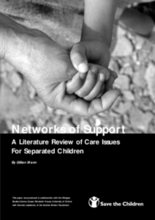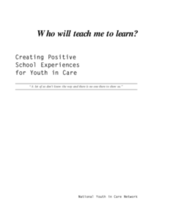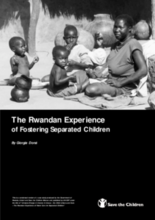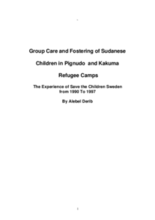Displaying 2131 - 2140 of 2168
The central theme of this volume is accountability for outcomes, certainly a current driving force in child welfare as well as in other public and private service fields.
This article, a chapter from the book Family Foster Care in the Next Century, describes several innovative types of shared family care arrangements that demonstrate promise in the protection of children and the promotion of family well-being.
This report reviews existing the literature on separated children and examines childhood, family, childcare practices and separation. It highlights the importance of context and child participation in designing programs and policies to assist separated children.
Research project examining the problems faced in the education of youth in care in Canada. Provides recommendations for supporting high school education and for including children in their educational planning.
The purpose of this report is to document the levels of child abandonment and de-institutionalization as an indicator of the quality of social transformation during the transition decade (1990-2000).
A report about a case-study in Rwanda documenting the practice of, and policies regarding, fostering (formal and informal). The study also explored the views of children in foster care, caretakers, agencies and local authorities regarding fostering.
A report recording the proceedings of a conference co-sponsored by the World Bank and World Vision. The two-day conference sought to promote awareness of OVC issues around the world, to provide practitioners with a forum to share best practices and other insights, and to probe the role of social protection in implementing a balanced response. Participants included but were not limited to: community and donor organizations, NGOs.
This study, commissioned by UNICEF, examines formal fostering policy and practice from the point of view of the Rwandan government and fostering agencies, and explores the perceptions of fostering of children, foster parents, local authorities and other members of local communities.
A case study that describes and analyzes Group care arrangements and the fostering program (“Family Attachment”) in the refugee camps in Pignudo (Ethiopia) and Kakuma (Kenya). This study includes the evaluation done on the Family Attachment program in Kakuma refugee camps which assessed it’s weaknesses and strengths.
Regulations on foster care arrangements in Moldova, including the process of recruiting carers, the conditions of placements, and financial measures.








